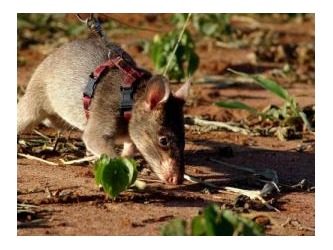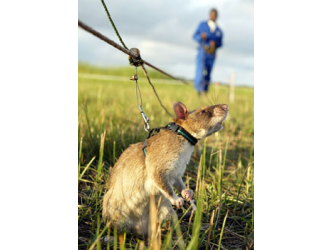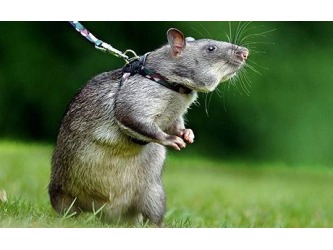Our Furry Friends
Rats in the Military!

Due to size, weight, intelligence, and social characteristics rats have been used to replace dogs in sniffing out landmines. The rats are easily trained in mazes to navigate certain courses. They have a great sense of smell just as a dog might. Their small size and low weight will not set off mines should they step on one. An upside of replacing dogs with rats is their very low cost. It takes thousands of dollars to get a well-trained dog to sniff out the mines. Rats are extremely intelligent creatures and are easily trained for these tasks. Many African Pouched Rats have also been used to diagnose tuberculosis with their highly sensitive noses. In Tanzania, rats have found 300 cases of TB that had not been diagnosed by medical staff.
The rats involved in finding land mines in Mozambique have been bred to be the size of raccoons. While the squads of mine-sniffing rats were mocked at first, officials are considering using them in the Democratic Republic of Congo, Zambia and other countries where unexploded mines remain common.
Bart Weetjens (above) got the idea to train rats while he was in Africa working with landmines. The rats are trained to scratch when they smell the vapor from the landmines. Rats are then rewarded with treats such as fruit and nuts.
Weetjens was asked why the rats don't simply scratch to get food: "That would be human behavior; The rats are more honest."
The rats' success rate in mine detection is 96 percent. Unlike dogs, the rats weigh a lot less and therefore don't trigger explosions. Colombia is home to the world's largest number of land mine victims. Last year, there were 1,108 victims, or about one every eight hours. Nearly a quarter of the victims die from their injuries.
The rats involved in finding land mines in Mozambique have been bred to be the size of raccoons. While the squads of mine-sniffing rats were mocked at first, officials are considering using them in the Democratic Republic of Congo, Zambia and other countries where unexploded mines remain common.
Bart Weetjens (above) got the idea to train rats while he was in Africa working with landmines. The rats are trained to scratch when they smell the vapor from the landmines. Rats are then rewarded with treats such as fruit and nuts.
Weetjens was asked why the rats don't simply scratch to get food: "That would be human behavior; The rats are more honest."
The rats' success rate in mine detection is 96 percent. Unlike dogs, the rats weigh a lot less and therefore don't trigger explosions. Colombia is home to the world's largest number of land mine victims. Last year, there were 1,108 victims, or about one every eight hours. Nearly a quarter of the victims die from their injuries.



